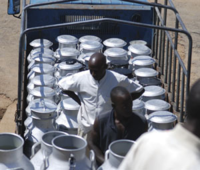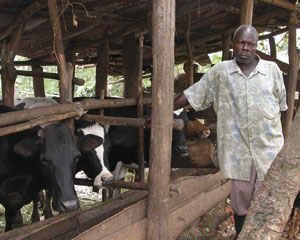Click here to register!
Difference between revisions of "Biogas-Powered Evaporative Cooling for Uganda’s Dairy Industry"
***** (***** | *****) (→Impact) |
***** (***** | *****) |
||
| Line 44: | Line 44: | ||
<br/> | <br/> | ||
| − | + | <br/> | |
= Impact<br/> = | = Impact<br/> = | ||
| Line 54: | Line 54: | ||
<br/> | <br/> | ||
| + | <br/> | ||
= Organization<br/> = | = Organization<br/> = | ||
| Line 64: | Line 65: | ||
UGARF has completed a baseline study and identified smallholder farmer households to participate in their study. They have continued to perfect performance of the device and installed a demonstration unit at a partner site in Wakiso District. The initial stages have begun for the manufacture of 25 units that will be deployed among the participants. UGARF has also developed training materials that will be used to train participants before systems are installed on their farms.<ref name="Powering Agriculture, UGARF: http://poweringag.org/innovators/biogas-powered-evaporative-cooling-dairy-industry">Powering Agriculture, UGARF: http://poweringag.org/innovators/biogas-powered-evaporative-cooling-dairy-industry</ref><br/> | UGARF has completed a baseline study and identified smallholder farmer households to participate in their study. They have continued to perfect performance of the device and installed a demonstration unit at a partner site in Wakiso District. The initial stages have begun for the manufacture of 25 units that will be deployed among the participants. UGARF has also developed training materials that will be used to train participants before systems are installed on their farms.<ref name="Powering Agriculture, UGARF: http://poweringag.org/innovators/biogas-powered-evaporative-cooling-dairy-industry">Powering Agriculture, UGARF: http://poweringag.org/innovators/biogas-powered-evaporative-cooling-dairy-industry</ref><br/> | ||
| − | |||
| − | |||
<br/> | <br/> | ||
| Line 79: | Line 78: | ||
*[[Uganda Energy Situation|Uganda Energy Situation]]<br/> | *[[Uganda Energy Situation|Uganda Energy Situation]]<br/> | ||
*[http://wbi.worldbank.org/wbdm/idea/renewable-energy-powered-milk-cooler-smallholder-dairy-farmers Renewable Energy-powered Milk Cooler for Smallholder Dairy Farmers]<br/> | *[http://wbi.worldbank.org/wbdm/idea/renewable-energy-powered-milk-cooler-smallholder-dairy-farmers Renewable Energy-powered Milk Cooler for Smallholder Dairy Farmers]<br/> | ||
| − | |||
| − | |||
<br/> | <br/> | ||
| Line 88: | Line 85: | ||
<references /> | <references /> | ||
| + | [[Category:Cooling]] | ||
| + | [[Category:Sub-Saharan_Africa]] | ||
| + | [[Category:Impacts]] | ||
| + | [[Category:Uganda]] | ||
| + | [[Category:Biogas]] | ||
[[Category:Powering_Agriculture]] | [[Category:Powering_Agriculture]] | ||
| − | |||
| − | |||
| − | |||
| − | |||
| − | |||
Revision as of 11:41, 31 May 2016
Overview
|
Innovator |
||
|
Project |
||
|
Collaborators |
Smallholder Fortunes (Uganda) | |
|
Location Applied |
Throughout sub-Saharan Africa, the dairy industry suffers from lack of proper refrigeration options. Large dairies cannot export milk to neighboring markets due to international standards requiring milk be cooled within four hours of production. Small farmers may lose 20-50% of milk to spoilage due to lack of cold-chain facilities. There is limited access to electricity for refrigeration units, and kerosene and solar-powered options have proved too expensive and difficult to operate.
Clean Energy Solution
University of Georgia Research Foundation (UGARF) has developed a refrigeration unit powered on biogas - which is extracted from cow manure. The unit regenerates zeolite plates, which retain their capacity to capture water vapor from the evaporative milk chilling process. Partnered with Smallholder Fortunes, UGARF is refining the design of the refrigeration unit, and testing it with farmers in Uganda. UGARF will work with local manufacturers to secure financing and bring production of the units to commercial scale.[1]
Impact
This project has numerous social, economic, and environmental benefits. Refrigeration units will benefit dairy farmers by decreasing milk spoilage and increasing production and profits. Captured biogas can be used for lighting and cooking - saving income that would otherwise be spent on kerosene, and replacing the use of wood and charcoal for cooking. Also, by extracting biogas from cow manure, greenhouse gas emissions from fermenting cow manure is mitigated.[1]
Organization
The University of Georgia Research Foundation, Inc. (UGARF) is a nonprofit entity housed within the University of Georgia (UGA) in the United States that enhances UGA’s excellence as a research and higher education institution. Smallholder Fortunes is a small-scale dairy farm located in Wakiso District, Uganda.[2]
Progress Update
UGARF has completed a baseline study and identified smallholder farmer households to participate in their study. They have continued to perfect performance of the device and installed a demonstration unit at a partner site in Wakiso District. The initial stages have begun for the manufacture of 25 units that will be deployed among the participants. UGARF has also developed training materials that will be used to train participants before systems are installed on their farms.[1]
Further Information
- Powering Agriculture Portal on energypedia
- Powering Agriculture Homepage, Winners/ Innovators
- Powering Agriculture: An Energy Grand Challenge for Development
- Powering Agriculture Newsletters
- University of Georgia Research Foundation (UGARF) Homepage
- Smallholder Fortunes Homepage
- Uganda Energy Situation
- Renewable Energy-powered Milk Cooler for Smallholder Dairy Farmers
References
- ↑ 1.0 1.1 1.2 Powering Agriculture, UGARF: http://poweringag.org/innovators/biogas-powered-evaporative-cooling-dairy-industry
- ↑ UGARF: http://research.uga.edu/ugarf





















